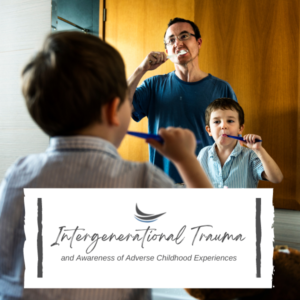 You may be familiar with the term generational trauma (also known as inter-generational trauma) …trauma which is passed down through the generations but how exactly down trauma pass and what can be done?
You may be familiar with the term generational trauma (also known as inter-generational trauma) …trauma which is passed down through the generations but how exactly down trauma pass and what can be done?
Intergenerational trauma impacts how you react to stress, regulates mood, behavior, and even can impact one’s DNA- by impacting how genes function which is known as epigenetic change. The DNA codes itself to have a survival response in response to trauma, which can be passed down through future generations even in the absence of additional traumatic events. Research suggests that there are biological consequences from intergenerational-trauma, in addition to psychological and behavioral impacts.
Understanding more about the impact of adverse-childhood-experiences-(ACES) is a good place to start in understanding the connection to how trauma impacts children (and future generations of children) into adulthood. Adverse childhood events are defined as potentially traumatic events that occur during childhood (0-17).
Three broad categories of events include abuse (physical, sexual), neglect (physical, emotional), and household dysfunction (mental illness, substance abuse, family violence, separation/ divorce, incarceration). Categories have expanded to include death in the family, violence within the neighborhood, economic hardship, racism, and discrimination.
Adverse childhood experiences are common.
- 60% of U.S. adults have 1 ACE
- 25% of U.S. adults have 3+ ACEs
- 16% of U.S. adults have 4+ ACEs
According to the original ACE study and subsequent research, adverse childhood experiences have been connected to negative health outcomes in adulthood.
Health conditions include depression, heart conditions, asthma, kidney disease, stroke, cancer, diabetes, and obesity. Smoking and heavy drinking increased health risks. In addition, socio-economic challenges such as unemployment, lack of insurance, and less than a high school education have been linked. ACES impact all people but are more common in low income and racial or ethnic minority populations.
Toxic-stress is a major underlying factor, as the nervous system’s stress response is activated in response to traumatic and highly stressful experiences. When the body maintains an activated response to chronic and repeated stressors over a long period of time, the impacts can be damaging both to the brain and the body. Because children’s bodies and brains are still developing, the impact of toxic stress can have long-term consequences into adulthood and the effects of trauma can be passed down generations. Descendants can show symptoms of intergenerational trauma, including racial trauma or other systemic trauma such as anger with triggering events, self-destructive behavior, depression, survivor guilt, internalized oppression, and low self-esteem.
Although ACEs are a wide-spread and serious problem, they are also preventable. By increasing awareness of adverse-childhood-experiences, we can help other shift thinking about the causes and solutions. By shifting focus from the individual to the community and creating safe, supportive environments, we can work together to find solutions that reduce stigma and shame for seeking help.
Written By : Charlotte Johnson, MA, LPCC
We’re Here to help
Our wellness experts will be happy to take care of you. You can CLICK HERE to schedule an appointment now or call (612)223-8898.
Meet Clinicians
We’re united by our commitment to providing effective, relevant, and innovative mental health support at all stages of your journey. Click Here to find out more about who we are, where we come from, and how we live out CARE’s mission every day.
The professionals at CARE are actively collecting and creating resources to help with what you need. We’re Here for You.



